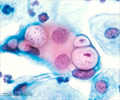Gonorrhoea-causing bacteria develops resistance to antibiotics quite quickly and if new treatment is not considered soon the sexually transmitted infection may become extremely difficult
Gonorrhoea-causing bacteria develops resistance to antibiotics quite quickly and if new treatment is not considered soon the sexually transmitted infection may become extremely difficult to treat, an expert has warned.
Addressing the Society for General Microbiology's spring meeting in Edinburgh, professor Catherine Ison said it was quite possible that strains of Neisseria gonorrhoeae resistant to all current treatment options could emerge in the near future.Prof Ison, from the Health Protection Agency (HPA) in London, explained how some strains of the gonococcal bacteria that cause the disease are now demonstrating decreased sensitivity to the current antibiotics used to treat them - ceftriaxone and cefixime.
Gonorrhoea is a common bacterial sexually-transmitted infection and if left untreated can lead to pelvic inflammatory disease, ectopic pregnancy and infertility in women.
Current treatment consists of a single dose of antibiotic given in the clinic when prescribed, by mouth for cefixime and by injection for ceftriaxone.
Prof Ison said: "Choosing an effective antibiotic can be a challenge because the organism that causes gonorrhoea is very versatile and develops resistance to antibiotics very quickly.
"Penicillin was used for many years until it was no longer effective and a number of other agents have been used since. The current drugs of choice, ceftriaxone and cefixime, are still very effective but there are signs that resistance particularly to cefixime is emerging and soon these drugs may not be a good choice."
Advertisement
Ongoing monitoring of antimicrobial resistance is critical to ensure that first-line treatments for gonorrhoea remain effective.
"If this problem isn't addressed then there is a real possibility that gonorrhoea will become a very difficult infection to treat," she added.
Source-ANI
SRM











